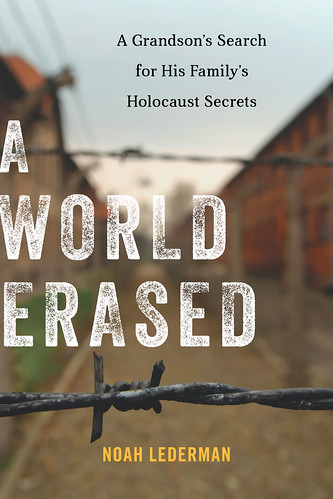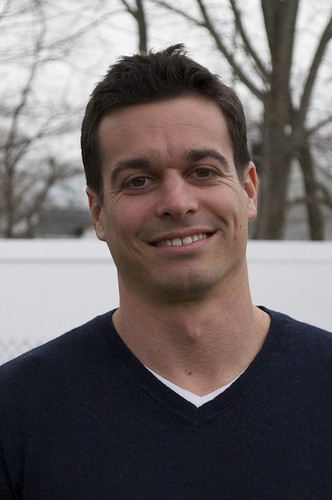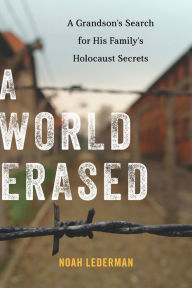Have you ever read a memoir that you couldn't put down? They are rare, but I've found one: A World Erased: A Grandson's Search for His Family's Holocaust Secrets. Author Noah Lederman (we've shared his book, Traveling the Cambodian Genocide, here) delves into his family's past - both in the United States, and at different concentration camps and towns in Europe. His phenomenological work tells of a childhood filled with love, food, and incredible grandparents, which turns into a quest for understanding - of the lives of those we love most, of the horrors of concentration camps during the Holocaust and how people lived through them, of chance and bravery, of travel and research, of tackling such a horrific subject...so that we don't forget.

How much do we know about our family members, our friends, the ones we love? What happens when you uncover the past (as much as anyone can, really), and ask the hard questions? Lederman is an excellent writer, and not only shares family memories, but his journey to understand the lives of his grandparents - what they survived during the Holocaust - and how that affected the rest of their lives. It is powerful, moving, and
I have never read a memoir that held my attention so much that I couldn't sleep; turning out the light at 6am when the sun was rising, as I turned the last page, I felt bereft at finishing, awe at Lederman's words and story, and love for his family. Over my morning coffee, I thought deeply about how important personal histories are - that we must honestly represent lived lives, so that mistakes and horror aren't revisited. I thank Lederman for sharing his family history, for traveling and discovering his family's history, and for writing this incredibly important book.
Highly recommended.
We were lucky enough to catch up with Noah, and ask him about A World Erased, inspiration, why it's important to share the stories of the Holocaust, travel, family, and more. Here's what he had to say...

Please tell us about your new book, A World Erased...
This is a story about my search for my grandparents' Holocaust secrets. As a child, I had always been curious about my grandparents' lives during the Holocaust. I had known that they were a part of the Warsaw Ghetto Uprising and that they had survived a number of camps, including Auschwitz. But all of the stories connected to these places were off limits to me. When my father and aunt were young, my grandparents spoke of the camps without hesitation. This traumatized their children. In fact, my father slept with a packed suitcase beneath his bed, in Brooklyn, New York, because he expected that the Nazis would come for him and he would need to be ready to run. So my grandparents did their best to protect the grandchildren. And I did my best to get to the stories.
What inspired you to write this book?
I always felt like my grandparents' stories--the few that I did know--deserved telling. But of course that was not possible since Poppy and Grandma hid their stories. Learning of their pasts felt even less likely after my grandfather died and my grandmother fell into a deep depression. So after college, I traveled the world for fifteen months, and I had one rule: Avoid Poland. While the Germans were my grandparents' persecutors, the Poles, who had been my grandparents' neighbors, were the ones who had conspired and collaborated with the Germans, denouncing Jews to Nazis and then standing outside of Jewish homes with their loot sacks, as the Jews were dragged into the streets to be shot in the forest or sent to the death camps. They had a strong dislike for their countrymen.
A year into my trip, after I had arrived in the Czech Republic, visited a concentration camp, and saw the Jewish quarter in Prague, which Hitler had preserved, as he intended to use Prague's Jewish quarter for propaganda purposes, I sent an email to my father to tell him all that I had seen. I figured he'd ignore the email because he never had an interest in speaking with me about the Holocaust. Instead, he sent me my grandparents' addresses in Poland. I had no idea that these addresses had even existed. I decided to break my one rule and I traveled to Poland. The things that I had seen in my grandparents' hometown, in the former Warsaw ghetto, and in the concentration camps allowed my grandmother to break her silence. And, paradoxically, speaking about Poland was the very thing to pull her from her depression. For the next six years, she shared with me her Holocaust stories.
Why is it critical to uncover and share the stories of the Holocaust?
Unfortunately, the witnesses to this history are nearly all gone. And at the same time, Holocaust denial and revisionism is on the rise. Recently, we've seen the generalizing and lessening of the Holocaust from our own politicians. As the number of Holocaust survivors moves toward zero, it becomes the responsibility of future generations to keep the stories present and relevant. We continue to see devastation across the globe, and every decade there's another genocide. The purpose of teaching the Holocaust today is to bring credence to the phrase "Never Again", so it's critical to continue this effort, and find new ways to push education and legislation forward if we ever want those two words to ring true for all people.
Your travels in Europe were changed after hearing your grandmother's Holocaust stories - how can travelers respectfully travel to and learn from visiting Holocaust sites, museums, concentration camps?
If you visit a concentration camp or another site of persecution, if you are walking the grounds where one person had been dehumanized or one million Jews had been murdered, you should be there to learn, to remember, to bear witness. It's not a place for selfie-sticks, which seems like an obvious thing to say. But I've seen it in Auschwitz quite a few times. So it's really about intention: are you there to learn or are you visiting with the chief goal of posting a selfie on Facebook?
How did your impression of your grandparents' change over the course of writing this book?
I had always been obsessed with Poppy's stories. As a boy, I knew that he had been a fighter and a sewer rat during the Warsaw Ghetto Uprising--these were the boys who snuck through the sewers, emerged on the Polish side of the wall, and smuggled weapons and food back into the ghetto for survival and for the month-long uprising. After his funeral, I learned that he had killed a Nazi with pitchfork. I decided that I had to write a book about Poppy's heroics. Grandma, while she had survived some of the worst concentration camps, always presented herself as the stereotype of an old Jewish woman; she cooked and cleaned and complained. Since my grandparents had survived many of the same places, and since Poppy had already died, I told Grandma that I wanted to write a book about Poppy. When I started interviewing her, most of my questions were about Poppy in Warsaw, Poppy in Majdanek, Poppy in Auschwitz. She told me the few things that she remembered about her husband's experiences in those places, but then naturally, she shared her own memories of those same places. And the horrors and heroics that she spoke of shocked me. This was a woman who had defied Nazi orders, faced down a German with a gun, lied to Mengele (twice), and outsmarted everyone from the Ukrainian soldier who murdered her mother to the guards in the camps, who were looking for any reason to take her life. I realized that I had been stupid to think that the book should only focus on Poppy, and I discovered that Grandma was just as brave.
What's up next for you?
I'm completing three projects right now: one is a novel set in Flushing, New York, the other is a nonfiction book about the year that I spent surfing around the world, and the third is a television pilot about vigilantes. And I'm still writing travel stories for a number of magazines and newspapers, as well as my travel blog, Somewhere Or Bust.
Is there anything else you'd like to share?
For those interested in attending a book talk, I'll have posted my events https://noahlederman.wordpress.com/events/ for the second half of the year by the summer. Or you can just follow along on Twitter and Facebook, where I'll announce future talks and news about A World Erased.
Click the photo to purchase A World Erased from Barnes & Noble:

